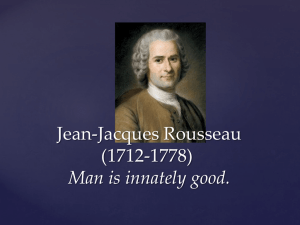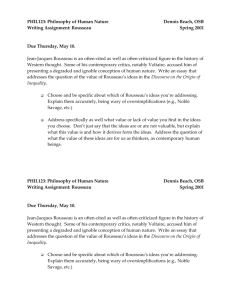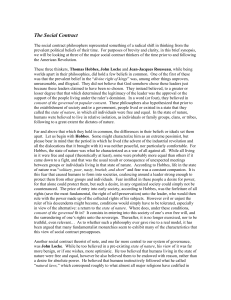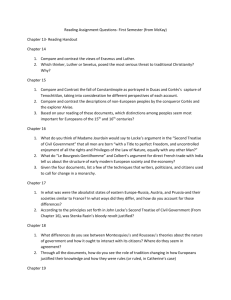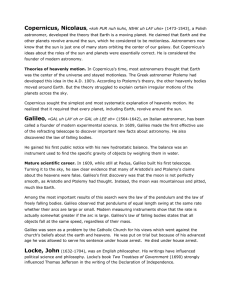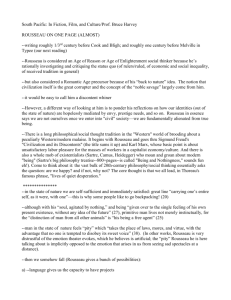History 104 7 February 2011 Ch. 17: Science & Sentiment The
advertisement
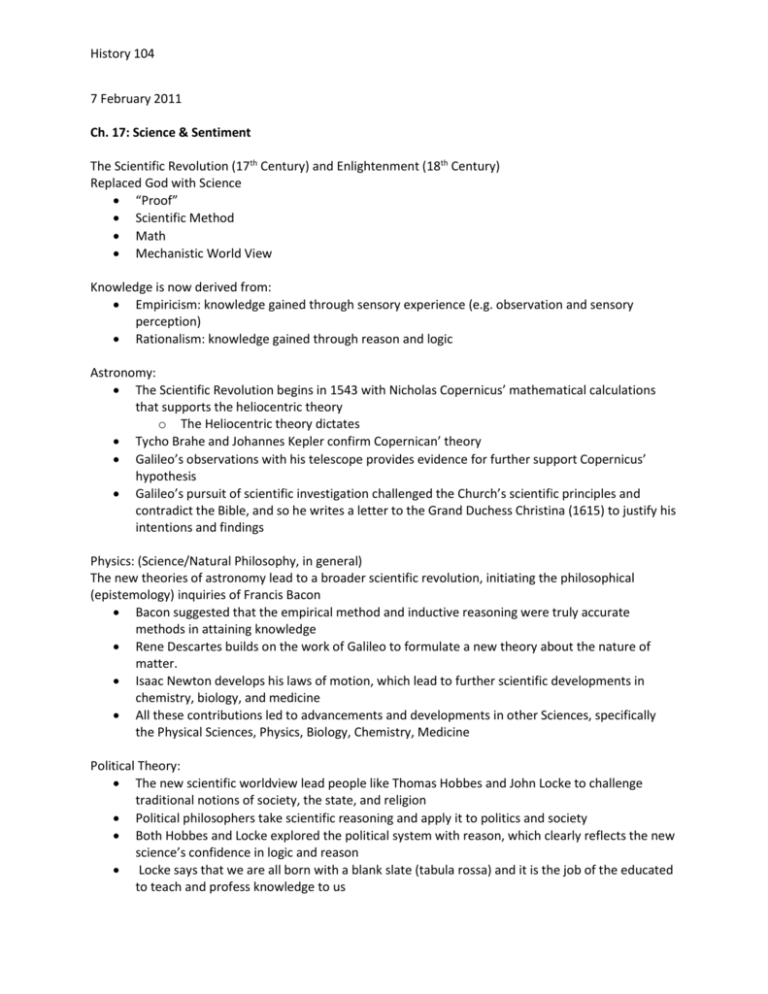
History 104 7 February 2011 Ch. 17: Science & Sentiment The Scientific Revolution (17th Century) and Enlightenment (18th Century) Replaced God with Science “Proof” Scientific Method Math Mechanistic World View Knowledge is now derived from: Empiricism: knowledge gained through sensory experience (e.g. observation and sensory perception) Rationalism: knowledge gained through reason and logic Astronomy: The Scientific Revolution begins in 1543 with Nicholas Copernicus’ mathematical calculations that supports the heliocentric theory o The Heliocentric theory dictates Tycho Brahe and Johannes Kepler confirm Copernican’ theory Galileo’s observations with his telescope provides evidence for further support Copernicus’ hypothesis Galileo’s pursuit of scientific investigation challenged the Church’s scientific principles and contradict the Bible, and so he writes a letter to the Grand Duchess Christina (1615) to justify his intentions and findings Physics: (Science/Natural Philosophy, in general) The new theories of astronomy lead to a broader scientific revolution, initiating the philosophical (epistemology) inquiries of Francis Bacon Bacon suggested that the empirical method and inductive reasoning were truly accurate methods in attaining knowledge Rene Descartes builds on the work of Galileo to formulate a new theory about the nature of matter. Isaac Newton develops his laws of motion, which lead to further scientific developments in chemistry, biology, and medicine All these contributions led to advancements and developments in other Sciences, specifically the Physical Sciences, Physics, Biology, Chemistry, Medicine Political Theory: The new scientific worldview lead people like Thomas Hobbes and John Locke to challenge traditional notions of society, the state, and religion Political philosophers take scientific reasoning and apply it to politics and society Both Hobbes and Locke explored the political system with reason, which clearly reflects the new science’s confidence in logic and reason Locke says that we are all born with a blank slate (tabula rossa) and it is the job of the educated to teach and profess knowledge to us History 104 o Locke says you have to train the rational mind She Stoops to Conquer (1773) by Oliver Goldsmith suggests that the women during the 18th century were now attracted to scholarly men Voltaire: What makes somebody human is their ability to use their brain, their rational capabilities Science is the ultimate expression of the rational mind Man-made vs. Natural-made: man-made objects show the uses to the rational mind: o He loved technology, because technology is the expression of the rational mind made by materials Works on the encyclopedia making sketches and describing the apparatuses and technology of milking cows, farming, etc. Voltaire’s overall message: Man’s dominion over nature o Man controls nature through the use of his mind Did not like the Church or religion at all o Dislikes the extraordinary brutality that stems from the Church As a lawyer, represented a man who killed his son who converted from Catholic to Protestant Religion was to blame for a lot of humanity’s suffering and cruelty o Dislikes the supernatural explanations to justify natural events Rousseau: The people’s will: the desire/want for something o E.g. economic state, less taxes, stronger parliament Rousseau saw the people not as subjects (to whom things occur), but they are individuals who can make things happen Rousseau and Voltaire hated each other; Locke’s ideas vs. Rousseau Rousseau believed what makes us human is art, intuition, that what is natural to you o It’s not that we think, it’s that we feel o For Rousseau, it’s the emotions, the heart, the will (internal goodness) o Internal goodness is expressed by the people to stimulate further social progress Rousseau wants children to experience and then learn, o to learn when they want to teach themselves The Social Contract (1763) by Jean Jacques Rousseau also investigates the nature of man and suggests that sovereignty lies within the peoples’ will Sentimentalism: Pre-arranged, fixed marriages for economic purposes restricted sexual expressions, which also inhibited the emotional expressions of a couple For example, in The Stoops to Conquer by Oliver Goldsmith, the father tries to convince his daughter to marry a young man because he “has a good head on his shoulders, is a scholar, and can take care of the family” o The daughter thinks the young man is not too bad as raw material and she will change him o Making fun of a strain of sentimentalism o Marry who your heart thinks you should marry o You should marry out of love, not because of economic purposes or property reasons History 104 Playwright is making a very gentle commentary/critique, making fun of the marriage game There is some value of setting up a marriage o During this era, there were many unwed pregnant women, many bastard children who did not have a father. o Many couples were falling in love and having sex, but not being married Sentimentalism supports the idea of a Noble man/prince falling in love with the peasant girl/the dairy girl

